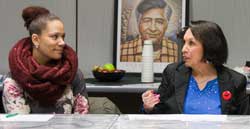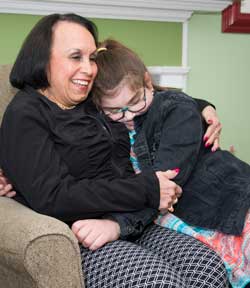Anyone attempting to digest Lupe Ramos-Montigny’s entire resume would be well-advised to reserve the better part of an afternoon, and be sure to allow for snacks and hydration.
But if you were short on time and wanted to condense her life into a single word, this might suffice:
Doer.

In her nearly 75 years, she’s done as much as anyone – and perhaps more than any Latina – to advance educational opportunities for children in Grand Rapids and beyond. Armed with a passion to change things that need to be, people who know her agree that you either hop on her wagon for social justice and equity or get the heck out of the way.
And don’t expect a lot of breathless rhetoric or political correctness.
“She’s not careful,” says Michigan State Rep. Winnie Brinks (D-Grand Rapids), “because she doesn’t need to be careful. She says what she thinks, and she’s not beholden to anybody.”
By the same token, says Brinks, a longtime activist and current candidate for the State Senate later this year, Ramos-Montigny is “quick to comment, but also committed to being right. And I have never known her to not take ownership for something if she is wrong.”
Brinks is especially impressed with the way Ramos-Montigny often seems to have someone in tow, learning the ropes. “She is a networker,” Brinks observes. “She almost always has a young person that she’s mentoring, bringing them around to help get them connected and involved.”

Strong Roots in Faith and Family
She was born on Dec. 12, a date that doubles as the feast day of Our Lady of Guadalupe, who according to the Catholic Church appeared to St. Juan Diego in 1531, sparking the conversion of some 8 million Mexicans to Catholicism over the ensuing decade. Lupe is named after that venerated image of the Blessed Virgin Mary, a moniker she carries proudly. Ramos, meanwhile, is her given maiden name, and Montigny what she retains from her marriage to ex-husband Remi, of French descent.
A native of Texas, Ramos-Montigny is the seventh of nine children born to parents who never advanced past the third grade, but in her mind “were Ph.D.’s in their own right, for the gifts they brought to their greater community and lessons they imparted on their children and others.”
“My parents had very strong family values,” she says. “Respect was of the utmost importance. And we learned that hard work was part of life. They also understood that education was the door to opportunity.
“We all became something,” she says of her brothers and sisters, and she rattles off roles as pastor, doctor, businessman, attorney, Realtor, nurse and more.
“As we came of age,” Ramos-Montigny remembers, “we were expected to chip in on everything. On Saturdays, we cleaned the house, mopped the floors, ironed and starched the clothes.”
At the age of just 10, Ramos-Montigny joined her parents and most of her siblings for what would be three consecutive summers working as migrants in Michigan — a round trip of 4,000 miles that they endured in an open-bed truck where clothing in a pillow case was all you took with you and “that was my bed and my seat for the trip.”
Even against the agrarian hardships, Ramos-Montigny fell in love with the topography, climate and culture of Michigan as the family picked cherries on Traverse County’s Old Mission Peninsula, then harvested beets in Caseville and tomatoes in a third locale.
“Oh the bay,” she says of the sparkling waters just steps away from the cherries they’d bucket. “And those hills.” It created indelible images in her mind, and convinced her at a young age to leave Texas in the rear-view mirror in favor of The Mitten.

No-Nonsense Educator
She got her chance while earning a bachelor of science degree from Pan American University in Edinburg, Texas, signing up to spend her senior year teaching migrant farm workers in Lake Odessa, a half-hour east of Grand Rapids.
Though homesick at first, she grew to love Michigan enough that she moved north to teach a total of 36 years, first in Montcalm and Van Buren counties, and then for Grand Rapids Public Schools, where she served the better part of three decades
In the classroom, she was an innovator and a stickler, raising a family of two children while earning a master’s degree at Grand Valley State University, with an emphasis in bilingual education.
“I was a tough teacher,” she says, again brimming with pride. “What I did was assign everyone leadership positions, even if it was in the role of passing out papers, sharpening pencils, watering the plants. Everyone deserves to be a part of something.”
Her voice rises in remembering that “My students didn’t come into the classroom and ever act crazy. First thing, they had to line up. Then I’d check to make sure they had their paper and pencil, their lesson. Every day. Every hour. And if they didn’t have it, they’d better get it.
“Guess what? They’d only mess up once. Once. I mean, what good is a carpenter who shows up to work without his hammer? Are you going to work that day? You’d better figure it out.”
She shakes her head with disgust: “There were other teachers who would just give a kid who forgot another pencil. But that’s not making it a teaching moment, is it? In my class, you showed up and you’d better be ready to learn.”
Finding Another Gear
Ramos-Montigny retired from the classroom in 2008, but continued to beat drums for others, and in a dozen different ways.
She’d already heavily invested her time and efforts into the Hispanic community. For 17 years, she’s chaired the Committee to Honor Cesar E. Chavez that galvanizes an entire community each spring and serves as a springboard for scholarships. Three years ago, the Lupe Ramos-Montigny “Si Se Puede” (Yes We Can) Legacy Endowed Scholarship was established at GVSU. Since its inception, seven scholarships of $3,000 each have been awarded.
On the political front, she’s advanced the cause of the local Democratic party with gusto. She was elected to chair the Kent County Democratic Party, its first Latina. She’s also the first Latina to become the second vice-chair of the Michigan Democratic Party, and has attended numerous Democratic national conventions.
Since retiring especially, she’s received a dozen impressive awards for community action, including the Helen Claytor Civil Rights Award, Dave and Carol Van Andel Leadership Award, an honorary doctorate from Ferris State University and more. She also has served on behalf of innumerable committees, caucuses, foundations and organizations.
‘In my class, you showed up and you’d better be ready to learn.’ — Lupe Ramos-Montigny
In November 2012, she garnered nearly 2 million votes in earning a spot on the Michigan State Board of Education, with a term that extends through 2020.
People who have worked alongside Ramos-Montigny – and even those who have opposed her politically – agree it’s no surprise she’s ascended to lofty positions of trust.
“I’ve known Lupe for most of my adult life,” says former Grand Rapids Mayor George Heartwell. “She’s intensely loyal to her friends, and … well, I wouldn’t want to be her enemy.”
According to Heartwell, Ramos-Montigny “brings a passion and energy to everything she does. And since just about everything she does has to do with kids, that means there are few more passionate about the well-being of children than Lupe.”
Most recently, Heartwell points out, Ramos-Montigny is active with a statewide initiative known as the Safe Places Alliance, focused on protecting children and adults alike from gun violence. “In our present political environment,” Heartwell emphasizes, “this is frustrating work. But Lupe comes at it with dogged determinism.”
Indeed, it seems nothing can stand as an obstacle.
“There’s no book that says you have to like Ramos-Montigny,” she says with a laugh. “I just believe in doing good work, and hoping others join in.
“My motto? Do not allow anyone or anything to get in the way of progress.”














